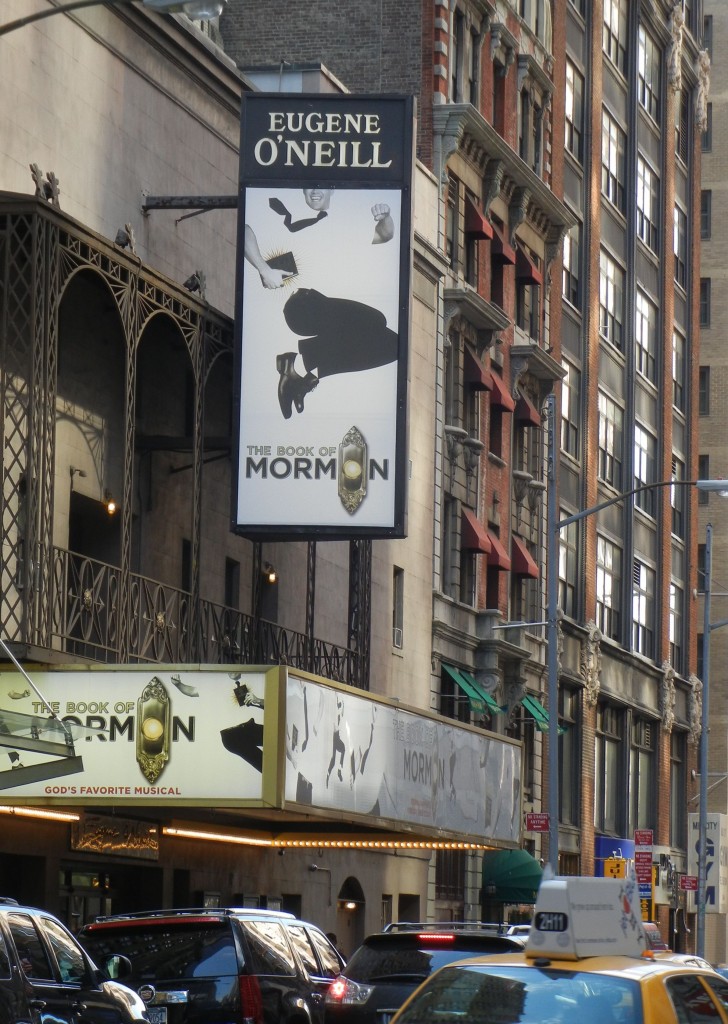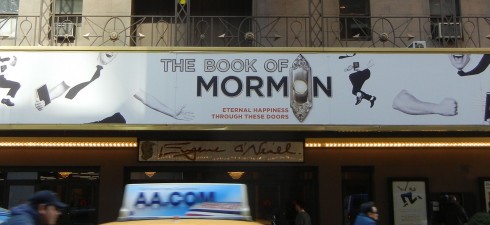 “A celebration of Mormonism by guys who aren’t Mormon,” is how South Park creators Trey Parker and Matt Stone describe their new musical written with Bobby Lopez, “The Book of Mormon”, scheduled to open this week on Broadway. And if you can jump a few hurdles, I’d have to agree with their summation.
“A celebration of Mormonism by guys who aren’t Mormon,” is how South Park creators Trey Parker and Matt Stone describe their new musical written with Bobby Lopez, “The Book of Mormon”, scheduled to open this week on Broadway. And if you can jump a few hurdles, I’d have to agree with their summation.
The theater was packed, and I was as interested to see who would pay the big bucks for this type of entertainment. Searching my fellow theater patrons for the tell-tale lines in their clothing, I found none. I looked for those who weren’t drinking alcohol, but that wasn’t helpful either. I honestly don’t know who the intended audience was, because the show was definitely too vulgar for a PG-13 audience, but neither was it anti-Mormon.
Sure, it was irreverent in traditional South Park-esque style. But the jabs at Mormonism paled in comparison to the irreverence to the very real plight of Ugandans dealing with war lords, a population nearly debilitated by the spread of AIDS and the horrific practice of female mutilation.
Rather than worry that we were being poked fun of, as a Mormon, I felt we had arrived. The humor towards us was good-natured and the story gave props to Mormons and religion in general that I just didn’t anticipate going in. The parts I found would offend my fellow Mormons the most were the casual use of the F-bomb and crass sexual references much more than any joke about our religion.
By show’s end, the Mormons were seen as people whose stories encourage their believers to “be nice to everyone” and “stand together.” There are humorous references made to Mormon guilt (the “Mormon hell dream” scene) and cognitive dissonance (“turn your feelings off like a light” scene), but they are friendly jokes made without anger or bitterness. Even a scene which compared a first baptism for a missionary to his first sexual experience was pretty tamely done and only proved the import of the ordinance within the Mormon faith.
Most funny to me were references which had to be written just for Mormons. From the names of the Elders being so traditionally LDS (Cunningham, Price, Davis, etc) to the Utah icons seen on the set (Zions Bank and Crown Burgers restaurant), the inside jokes were abundant. Elder Cunningham is admonished for not using the set discussions, Elder Price speaks of believing God lives on Kolob or hoping Heavenly Father shakes his hand to tell him what a great life he’d lived, while Elder McKinley substitutes O-M-Gosh for OMG, and extra effort by everyone is used to include Latter Day Saint when mentioning the Church. Hysterically funny to a Mormon, but these quips seemed meaningless to anyone outside the culture.
And when they referenced practices Mormons find more sacred, I found Parker, Stone and Lopez using particular restraint. Perhaps the most telling is a scene where the Elders get ready for bed. They are wearing garments, but the long underwear shown is clearly a symbol rather than an imitation when, let’s face it, it wouldn’t have been too hard to come up with the real thing. It’s a very subtle reference when full-on mocking would have been easy to come by. That’s generally the spirit with this show.
As I stood with a cheering audience at the end to applaud the efforts of the actors, orchestra and everyone else involved, I felt a connection to those who had written it and at the same time a sense of melancholy that those who could appreciate it the most would likely not be able to get past the assumption that it’s anti-Mormon and the South Park style humor factor to enjoy it.
And mostly I felt sadness that it takes people completely outside of my faith to see where the power of Mormonism lies. From watching the play, it appears that the creating trio actually respect Mormonism, but not for traditional reasons. It’s not the historicity of its claims and the exactness of its practices being celebrated, but rather, it’s the inspiring source Mormonism provides in the lives of its believers that proved to be the underlying theme of the show.
Though we laughed as an audience together throughout, this theme was not lost to the irreverent humor. On the streets of New York I overheard people speculate about how funny the musical was rumored to be. But after the show there was a palpable energy and admiration for not only its humor but its brilliant exploration into religion and the words of Elder Price, “I believe.”

Great review, Mel. When I saw that this was going to be a musical, I assumed it would be anti-Mormon, so I had no interest in seeing it. I guess I was too dismissive, though. Alas, I have no plans to go to NYC any time soon, so I’ll have to rely on word-of-mouth.
You do realize that some significant voices within the faith have pointed out where the “power of Morrmonism lies,” right?
Chris,
I’m not claiming that it hasn’t been said where the power of Mormonism lies, but most of what I hear on a local and church-wide level is about the truth of Mormonism, not the inspiration. Even in Elder Holland’s latest talk on the Book of Mormon, historicity and truth trump inspiration and impact. What’s great about this musical is it throws truth out of the equation, and instead of finding the Mormon church or the Book of Mormon “true” or “false”, it begs the question of its goodness, a question that was answered positively for me.
My brother who lives in NYC went to see this a few weeks ago. Granted, he hasn’t been to church since he was 14, but he said he just couldn’t get the huge grin off his face from beginning to end. While he said that orthodox Mormons might take some offense, people who don’t take themselves too seriously and don’t mind laughing at themselves will really get a kick out of it. I really want to see it. Maybe someday it will come to this neck of the woods.
@Dayna, by “this” neck of the woods, do you mean “East Texas” neck of the woods?? Hmmm . . . ;)
I’m curious to see how this plays out, how it’s reviewed, how it’s accepted/rejected by Mormons and non-Mormons alike.
Mel, I guess I got the same message from reading Lowell Bennion and Eugene England. To each their own.
Chris, I can think of any number of reasons why someone might take a pass on seeing this musical. Those with thin skins, for example, would probably be well advised to spend their money elsewhere, and that goes doubly for Ugandans as it does for Mormons. Likewise, if South Park is too low brow for your taste, The Book of Mormon probably is not your thing. But writing it off because the writers approach the subject from a different perspective than the one you and your favorite authors’ share strikes me as rather weak. It may be that you have more compelling reasons, but it’s hard to tell from the two sentences you’ve left here.
I am likely too fucking poor to fly to NYC and watch any musical at the moment. Maybe I will never truly understand Morrmonism because I will never see it. However, I think I likely understand class conflict and alienation without ever seeing Rent.
My point is that Mel (and others) feel that they have found an amazing message. Hell, the real power of Mormonism has been discovered. Yet, there is much written about Mormonism that lies between South Park and General Conference.
You could say the same about every play, every work of art, every symphony, every piece of literature, and so on and so forth. To write off these sorts of things merely because they approach their subject from a different viewpoint strikes me as a poor decision-making calculus. I’m not saying your life will be left unfulfilled or that your understanding of all things Mormon will be significantly and irretrievably impaired if you don’t see this musical. I’m simply saying that discounting the musical on the grounds you offered above is weak and unpersuasive. That said, being strapped for cash strikes me as a pretty good reason. I liked the musical a lot, but I wouldn’t recommend robbing a bank to see it.
Should have threaded my comment. Referring back to Chris’s comment at 10:21.
Chris’s Point:
Randy’s Head.
Thanks for the review, Mel. If I was a little closer to NY, I’d be right there. I can only hope it comes to London.
I think that your point is valid about the value of ‘outside’ voices for showing the value in Mormonism. Bennion and England may have been writing ‘within’ the church, but for whatever reason, their writings are largely unknown to the membership, at least where I’m from. Something as high-profile as ‘The Book of Mormon Musical’ has a shot at really making a mark in the social consciousness.
I think – by the sounds of your review – it’s probably aimed at an audience with some experience/on the fringes of Mormonism, but not the traditional core of membership. But I think change can come from the outside with the LDS Church, and a positive message will doubtless be absorbed in any way possible. I heard a lot of references to that ‘South Park’ episode from church members in my time.
I like Jana’s take: “It is an honor to be thus lampooned.”
http://blog.beliefnet.com/flunkingsainthood/2011/03/a-mormon-reviews-broadway%E2%80%99s-new-book-of-mormon-musical.html#ixzz1HLos9ywS
Between your review and Jana’s, Mel, I really hope I get to see the show soon.
Nicely done. I’m sure it will make its way to East Texas at some point, right? Love the picture.
I’ve seen the show twice now and I swear it is the funniest, more clever, most positive thing I have ever seen. And the song “I Believe” brings a tear to the eye of this non-believing, non-practicing Mormon. It is not the most full-out song in the show, like Spooky Mormon Hell Dream, but after seeing it twice I can say it is the song the audience seems to really respond to and it is a celebration of Elder Pryce’s faith.
If I can, I think I’ll see it again.